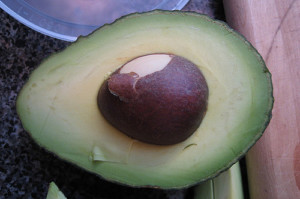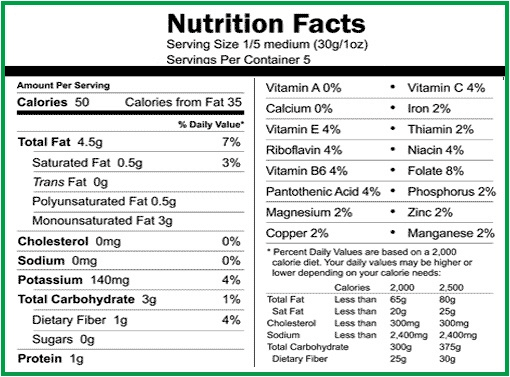
Despite their high fat content, avocado is not fattening
There is a misperception about avocados, and that is that they will make you fat. The confusion stems from the quite high fat content of avocado. A whole medium-sized avocado contains approximately 24 g of total fat, a whopping 30% of the recommended daily allowance. Most fruits contain little fat, but the avocado is packed with it.
Historically, prior to the 1990s, nutritionists advised that foods high in fat should be avoided. Because of fat’s high caloric content per gram, it was believed that a diet high in fat caused weight gain. At that time, little differentiation was given to the different type of fats, what we now refer to as “good” and “bad” fats.
About 30 years ago, however, research began to show that some types of fats are actually beneficial to general health and weight maintenance. Today, health experts tout the avocado’s fantastic nutritional content, despite it’s heavy dose of fat. The avocado is even prominently included on the list of ultra-healthy “super foods”.
Fat composition of avocados
It is critical to understand that, from a health and nutritional perspective, all fats are definitely not the same. And just because you eat fat doesn’t mean you will become fat. In fact, a healthy diet consists of about one third of its daily calorie intake coming from healthy fat sources. The key is eating the good kinds of fats –generally, those that come from plant-based sources rather than animal fats.
Plant-based fats, such as those in the avocado, are now linked to an increase in good HDL cholesterol and decrease in bad LDL cholesterol. Specifically, these fats are called monounsaturated and polyunsaturated fat. A whole avocado has 15 g of mono-unsaturated fat, mostly in the form of oleic acid, and 3 g of polyunsaturated fat.
For comparison, olive oil is nutritionally similar to avocado oil. Most of its fat content is also monounsaturated oleic acid. But olive oil, many people would agree, is one of the healthiest foods you can eat. Obviously, it should not be avoided just because it is nearly 100% fat. Cashew nuts are also very high in monounsaturated fat and oleic acid. So the fat content of avocados are quite close to both olive oil and cashews, and all three of these foods are now widely recommended for weight loss and well-being.
Saturated fat is the type linked to heart disease and clogged arteries. Generally, animal fats from meat are the highest sources of saturated fat. Red meats are packed with saturated fat, and that is why consumption of pork and beef has been declining in recent decades in favor of chicken and fish. A whole avocado has 3 g of saturated fat, only a small percentage of its total fat content. And some studies suggest that even plant based sources of saturated fat have positive effects on cholesterol levels.
Here’s why you do need to be careful with overall fat consumption when it comes to weight loss. Fat contains 9 calories per gram as opposed to only 4 calories per gram for carbohydrates and proteins. So, fat does pack a high caloric punch. And eating too many calories causes weight gain. The key to any diet and weight loss program is a healthy balance of fats, carbohydrates, and proteins. The only way that eating avocados will make you fat is if you go overboard with them. Fat should not be feared if kept in proper proportion: 30% of your daily caloric intake.
Avocado nutritional content

Avocados assist weight loss by promoting a feeling of satiety
One benefit to eating foods high in healthy fat, such as avocado, is that they tend to keep you feeling full for a long time. Fats are broken down slower in the digestive system than complex carbohydrates and proteins. Energy from fats is released more gradually into the bloodstream. This promotes proper weight maintenance and keeps blood sugar levels steady. So paradoxically, although avocados are packed with calories and fat, eating them in moderation will not make you fat and will actually assist with weight loss.
Avocados are also a great source of soluble fiber in your diet. An avocado has about 9 g of fiber, which is one third of the recommended daily allowance. There are two ways that fiber helps to keep you thin and healthy. First, fiber keeps hunger away. Fiber is not digestible. It makes its way through the digestive system until it is passed about 24 hours later. This bulk of indigestible material signals to the brain that the stomach is fuller, suppressing hunger. As the fiber passes through the intestines, it also helps to clear out waste material and keep you regular.
Secondly, eating soluble fiber gets rid of bad LDL cholesterol. It acts like a sponge in the intestines, soaking up LDL cholesterol and triglycerides, which is then excreted in stool. Dietary fiber takes the strain off of your liver and kidneys, because these organs don’t have to process bad cholesterol if the fiber soaks it up and clears it out first.
As one of the super foods, avocados are also packed with minerals and vitamins. They are particularly high in folate, vitamin K, copper, riboflavin, potassium, and vitamin E. Foods high in vitamins and minerals reduce feelings of hunger because the body is getting the nutrients it needs to run efficiently. Conversely, when we eat junk food we often get hungry quickly afterward. Since junk food is largely devoid healthy nutrition, the brain triggers feelings of hunger again quickly.
Avocados are not fat-burning foods
We’ve already addressed the myth that avocados make you fat. Another point of confusion with regards to avocado is that they are a “fat-burning” food. This implies that they are able to assist the body in expending calories faster than the body would normally be able to process.
This is definitely not true. Let me be clear: there is no such thing as a fat burning food. The body processes all foods based on their nutritional and caloric content. There is no food or supplement that assists the body to burn calories faster than it otherwise would or could. Any time you hear a claim that some food or product is “fat burning,” you can be assured that it is false. Any time.
Eating avocado seed is also good for weight loss and overall health
Avocado seed is loaded with soluble fiber and trace minerals, and soluble fiber is known to promote weight loss. Most people don’t know that avocado seed is edible and quite nutritious. Because avocado seed is toxic to some animals, there is a widespread belief that it is poisonous to humans as well. But this is not true. Please check out my detailed article on avocado seed nutrition and how to prepare it for consumption.
Avocado seed is also popular with the weight-lifting crowd as a dietary supplement, usually mixed with fruit smoothies and protein shakes. But avocado seed must be prepared before eating and that is not an easy process. I have also written about the health benefits of avocado seed extract supplements which are available in powder, capsule, and liquid form.
The bottom line about avocados and weight gain
The idea that eating fats will make you fat is outdated, and has been conclusively proved wrong by current research. Avocados and other foods high in healthy unsaturated fats should be included in recommended amounts in any healthy diet.
Remember that saturated fats, usually coming from red meats, are the bad fats that you need to watch out for. Currently, the suggestion is that fats should account for about 1/3 of your total calories. Consumed at recommended levels, avocados actually promote weight loss and a feeling of satiety. Don’t believe the myth that avocados should be avoided because they are fattening.
Do You Love Avocado?
 |  |  |
| Avocado Oil | Avocado Saver | Avocado Slicer and Pitter |


Leave a Reply